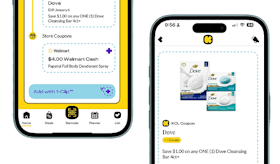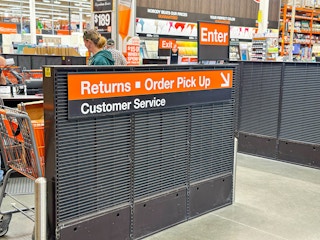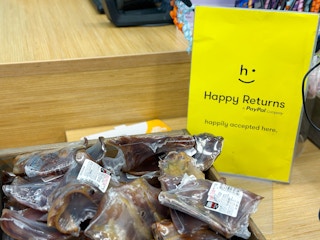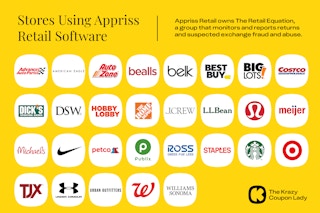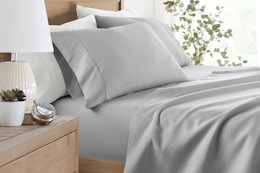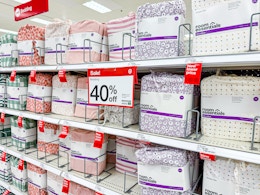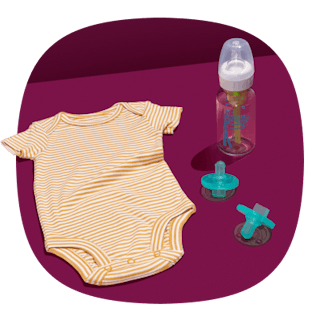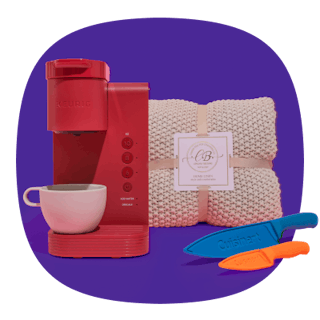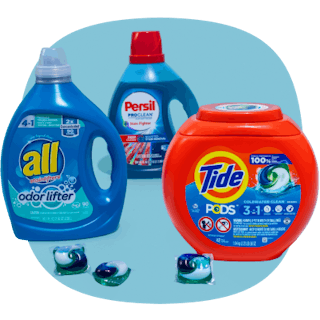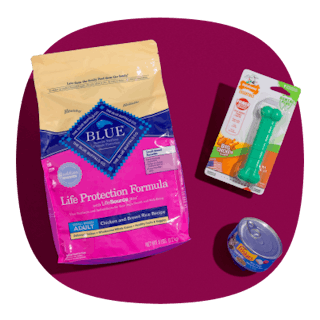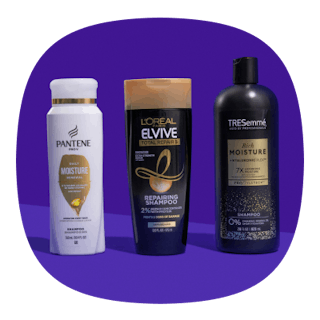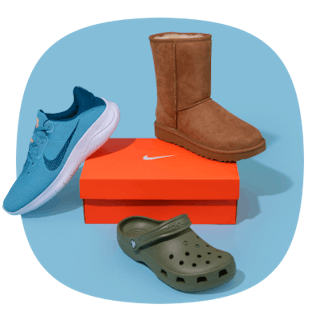Fun fact about me: I absolutely hate making returns. I'm a little ashamed of this because I consider myself a smart shopper. But unless the item in question is damaged or too expensive not to ask for a refund, I clam up at returns. Dealing with customer service? Admitting I bought the wrong thing? The store might have the best return policy, and I'd still rather have a root canal.
So imagine my surprise one January evening when I found myself on Anthropologie's store return ban list. Perhaps worse, I can't even make purchases anymore at Anthro, nevertheless return them. I discovered my banishment when the retailer continued to cancel any online order I tried to place.
Now I'll get into the how and why of my own ban woes in a minute, but the experience got me thinking. How rampant are store return ban lists, anyway? And why do they exist? So I set out to learn more about what gets customers banned, how retailers are tracking return behavior, and what to do if you find yourself wrongfully placed on a ban list.
Download The Krazy Coupon Lady app or text HACKS to 57299 for the latest money-saving tips, deals, and coupons.
What's on this page:
- Can a store ban you for too many returns?
- What gets you banned from returns?
- Here's what to do if you're on a store return blacklist.
- Not all store return bans have the same rules.
- Learning you're on a store return ban list
- The software program retailers use to track and flag return behavior
- AI return behavior analysis will hopefully end retail ban lists.
Can a store ban you for too many returns?
Legally, the answer is yes. Retailers are trying to combat a very costly problem: return fraud. According to a National Retail Federation (NRF) report, the total amount of money involved in 2023 merchandise returns was $743 billion. And of that, $101 billion was cited as fraudulent returns. This mean around 13% of all returns were made by intentionally bad actors — taking a major hit to retail's bottom line.
What gets you banned from returns?
As shoppers, we've gotten used to the luxury of flexible store returns. But Doriel Abrahams, Principal Technologist at Forter, a software company fighting fraud in the digital retail space, sees the unintentional consequences of these policies on a daily basis.
"U.S. retail is really supportive of the customer's always right notion," says Abrahams. "They want to make sure customers have the best experience so they'll come back and shop again, capitalizing on their lifetime value. But, of course, this sets up a really nice, shiny target for abusers and fraudsters."
These return behaviors present major red flags to retailers.
Scammers come in all shapes and sizes, using different methods of fraud return. The top three include the following:
-
Bracketing: buying multiples of the same or similar items, having them shipped, keeping one, and returning the rest.
-
Wardrobing: buying an expensive item, wearing it, then returning it.
-
Claims and Appeasements: filing a claim that you never received the item, or that the item came damaged or defective, so the retailer provides you with some sort of credit.
Less fraudulent, but often abusive return behaviors that are monitored:
-
Returning used items.
-
Returning items without a receipt.
-
Making more returns than a retailer allows within a given timeframe.
-
Breaking the retailer's basic return policy (like asking for a return after the allotted window).
Here's what to do if you're on a store return blacklist.
So you've found yourself on a return ban or blacklist — what do you do now? If you believe this has happened in error, you can request a Retail Activity Report from The Retail Equation to get more information. The Retail Equation is a group owned and operated by Appriss, Inc., a data and analytics company with a retail component. You can also ask them for further review of any denied transactions.
That said, I haven't found a ton of reports online finding The Retail Equation very helpful. But more on the company in a minute.
Abrahams, who investigates fraud for Forter and isn't associated with The Retail Equation in any way, suggests contacting the store's customer support directly. His team is measuring the success of approaches to return fraud in different ways, including pressure on customer support people.
"We're seeing a lot more complaints when merchants apply blacklists versus not," he says. "So definitely reach out to the store. Now it's a hard conversation to have with a customer success agent because of course an actual fraudster is going to claim they were wrongfully denied as well. They may have to speak with multiple channels to come to a resolution. But call them, plead your case and, pray to the commerce gods."
Not all store return bans have the same rules.
My store return issue resulted in both a ban on online purchases and returns. But depending on the retailer and the situation, a store return ban can be less strict.
"There are a lot of ways merchants can apply pressure on return fraudsters," Abrahams says. "One is the return ban preventing them from ever returning. While I agree that you should be able to prevent certain people from doing certain things, I think that a hard-coded ban list is problematic. There are so many instances where good customer behavior might fall within one of those logics to be put onto a banned list."
From his perspective, that defeats the entire purpose of wanting to maintain a good relationship with customers. And considering my personal experience, I happen to agree.
These are a few ways stores are handling suspicious return behavior.
-
Full ban from purchases and returns: Stores will prohibit certain shoppers from making both purchases and returns.
-
Ban on returns only: In other cases, the store will still accept your business, but you won't be able to return anything ever.
-
Restrictive return policy: Instead of a full return ban, retailers may opt to place flagged shoppers under a more restrictive return policy instead. Perhaps that means they have a week to return something instead of 30 days. Or maybe your refund can only be in the form of store credit.
-
Taking away reward program benefits: I came across a Target shopper (and RedCard holder) on Facebook who was flagged by the retailer after one particularly large return. She says they took away her Target Circle Bonus because of it. Customer service allegedly told her that while she could continue using her card at Target, she wouldn't be receiving any of the rewards that go along with it.
Shoppers usually learn they're on a store return ban list when attempting a new return.
So here's the thing about store return ban lists — retailers don't typically send you a notification. Instead, you'll find out you're on a ban list the next time you try to make a return and they deny it. Or, depending on the store's own penalty policy, you may not be able to make a purchase at that store at all. Which brings me back to my story.
I learned of my store banning when my online purchase was canceled.
Anthropologie had long been my go-to store. I shopped there for clothes, gifts, and even furniture. Over the 15 years I shopped there, I can probably count fewer than eight times I made a return. Because again, I hate making returns. However, about a year ago, I received a completely incorrect order than the one I'd purchased. It was a tank top and a pair of sneakers, while I'd ordered a sun dress and a pair of joggers.
This was a situation where I had no choice — I had to call customer service.
I clearly explained the situation., telling them that what I'd ordered was not what I received. The customer service rep was apologetic and understanding. She said Anthro still had the dress I originally ordered in stock, which they would send straight away. However the joggers were no longer available. So she issued a refund on that item.
After asking for a return label, I sent back what was clearly someone else's order. I didn't want anyone to be without their Veja sneakers and Pilcro knit tank.
Eventually Anthro sent me the dress. I thought we had this all cleared up. ( Narrator: But, in fact, it wasn't all cleared up. )
A few months later I received a strange email from Anthropologie.
Anthro and I had always had a very cordial relationship (I spent a ton of money at their store, they sent me a 20% off coupon during my birthday month, etc.). So when I received an email from Anthropologie threatening disruptions to my account because of an unreturned order, I figured this was either a glitch or a scam.
But then I went to place an order through their app. It seemed to go through just fine, until a few hours later when I received a cancellation email. That's weird, I thought. So I tried to place the order again. Same result.
To my understanding, the store believes I did a return bait-and-switch.
Ultimately it appears there's some confusion on Anthropologie's part. While my conversation with the customer service rep made clear that I did not receive those joggers, Anthro is still waiting for that item to be returned. But they're never going to get them, at least not from me, because I never received the joggers in the first place.
And this is how I found my anti-return self on a store return ban list.
Now back to The Retail Equation — a software program retailers use to track and flag return behavior.
I read tons of online stories from shoppers with denied returns. And several users said they were directed to The Retail Equation for help after their return was denied.
Stores use The Retail Equation to manage customer backlash and also support shoppers with denied returns linked to Appriss software. But shoppers don't claim to be getting the help or answers they need, at least according to stories I've read online.
I asked Appriss for an interview on The Retail Equation and how their return software impacts shoppers, but they declined. So I got most of my information directly from ApprissRetail.com.
Who's using The Retail Equation? Likely most of the industry's heavy hitters.
Again, without speaking directly to Appriss and The Retail Equation, I had to gather a list of their clients from the company's website. Now just because these stores are clients of Appriss, doesn't definitively mean they use The Retail Equation. However, many of the names on it do reflect store return blacklist stories I've seen across Facebook and Reddit.
AI return behavior analysis will hopefully end retail ban lists.
Not surprisingly, Abrahams and other technologists helping retailers fight fraud are embracing AI to determine which customers actually have malicious intent in their store transactions.
"I'm seeing merchants leaning towards a combination of solutions — using AI return behavior analysis but also establishing a very defined threshold for the worst of the worst fraudulent activity," he says. "It's very difficult to manage 10,000 different rules to prevent fraud. We're seeing a world of transition towards AI in almost every aspect of our lives and return abuse prevention is definitely part of that."
So will I ever be able to shop at Anthropologie again? Maybe, if I think it's worth my time (and anxiety) to walk through all of this with a customer service rep again . But for now, I'm happy spending my money elsewhere — which is a testament to how store return ban lists can backfire on retailers.
Related Reading:
Download the KCL app to add and redeem coupons in store
